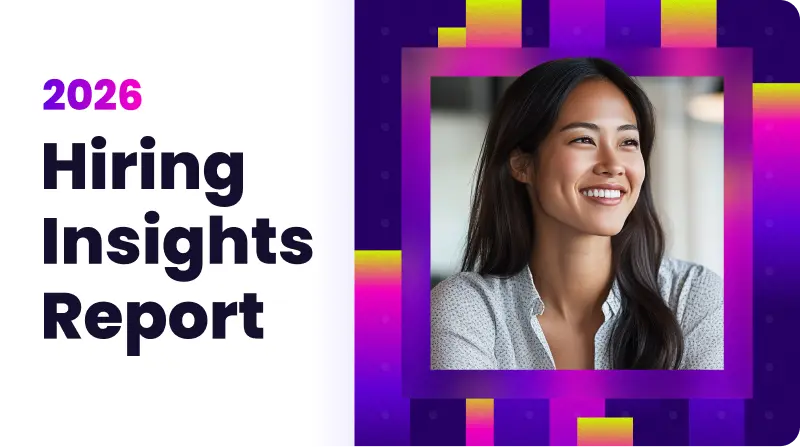Table of Contents
For enterprise talent acquisition teams, scheduling interviews isn’t just a logistical task — it’s a daily operational puzzle with hundreds of moving pieces.
Global teams. Multi-timezone coordination. Panels with five or more interviewers. Spikes in requisitions that turn hiring into an all-hands sprint. Add in hybrid work models, specialized roles, and constantly shifting calendars, and scheduling becomes one of the biggest barriers to hiring velocity.
And yet, many teams are still trying to solve this complexity with tools built for simpler times — calendar links, simple chatbots, ATS-native scheduling modules, or lightweight automation that only works in perfect conditions. The result? Interview coordination becomes a bottleneck, top candidates fall through the cracks, and recruiters spend more time chasing calendars than driving outcomes.
The stakes are high. In today’s competitive market, the speed and consistency of your scheduling process directly impact your ability to land top talent. But solving this at scale requires more than just a better booking tool — it takes a smarter, more adaptive approach to interview coordination.
In this article, we’ll explore how leading talent teams are navigating complexity at scale — and how AI-powered scheduling agents are transforming interview coordination from a pain point into a strategic advantage.

Unlock 2026’s top hiring strategies: Insights from 500+ TA leaders
Be the first to uncover deep hiring insights specific to your sector — straight from the highest-performing TA teams.

Where traditional interview scheduling tools break down
When interview scheduling is simple — a 1:1 phone screen with clear availability on both sides — nearly any tool will do. Most applicant tracking systems (ATS) even offer basic self-scheduling links that work fine for low-volume, low-complexity roles.
But enterprise hiring isn’t simple.
As soon as you introduce volume, panel interviews, or coordination across time zones, these “good enough” solutions start to crumble. Here’s where they fall short:
1. They can’t adapt to real-world complexity
Basic tools rely on rigid workflows. They expect ideal conditions: all interviewers are available, candidates respond quickly, no one reschedules. But real hiring isn’t so neat. Someone always drops. Calendars change. Schedulers scramble.
2. There’s no real automation — just templated convenience
Many systems offer calendar integrations or templated invites, but actual automation is minimal. If an interviewer declines, it’s back to manual searching. If a candidate needs to reschedule, the process resets.
And if you’re trying to coordinate a panel across multiple time zones? Good luck. Most systems aren’t equipped to balance availability, interviewer load, and candidate preferences dynamically.
3. Recruiters become the bottleneck
Without real automation, recruiting teams are stuck in the middle — chasing calendars, managing reminders, and manually rebooking interviews. For high-volume teams, this becomes a full-time job. For lean teams, it’s a source of constant friction and burnout.
4. Candidate experience suffers
When scheduling drags or rescheduling takes days, candidates notice. The experience feels disjointed — especially when they get conflicting emails, confusing links, or long periods of silence. And in a market where top candidates often accept offers within days, that delay is deadly.
In short: the systems most TA teams are using weren’t built to handle today’s hiring demands. But the best teams aren’t trying to force-fit outdated tools. They’re rethinking scheduling altogether — and bringing in intelligent systems designed to manage complexity, not ignore it.
Complexity in action: What enterprise TA teams are really up against
If you’ve ever coordinated a six-person panel interview across three continents, you know: complexity isn’t theoretical. It’s an operational reality. And for high-performing enterprise talent teams, it’s only growing.
Here are just a few examples of how that complexity plays out in the day-to-day:
Global time zones, local expectations
A product manager candidate in London. A hiring manager in San Francisco. Two engineers in Bangalore. A cross-functional panel with no shared availability for days. Coordinating across these calendars takes hours — unless your system can intelligently balance time zones, preferences, and working hours at scale.
Panel interviews that stretch across days
For leadership or technical roles, one interview block isn’t enough. Candidates meet with multiple stakeholders over several days — with some interviews virtual, others on-site. When one panelist reschedules, the entire sequence falls out of sync. It’s a cascading mess if you’re managing it manually.
Spikes in reqs that strain already-lean teams
Whether it’s a seasonal surge, a hiring sprint after a freeze, or a new location launch, high-volume spikes are common. But when interview scheduling is manual, even the most skilled teams can’t keep up. The bottleneck moves from sourcing to coordination — and suddenly, your funnel stalls.
Candidate ghosting and calendar chaos
In high-volume hiring, ghosting is part of the game. But without smart systems that can adapt, follow up, and fill empty slots fast, recruiters waste time chasing no-shows and scrambling to recover lost interviews.
For enterprise TA teams, these aren’t edge cases — they’re every week. The cost isn’t just time. It’s lost candidates, poor experiences, and missed goals.
That’s why leading teams are turning to a new model: adaptive scheduling powered by intelligent AI agents. Not just automation — orchestration.
From chaos to coordination: Meet your AI scheduling agents
Solving scheduling complexity at scale doesn’t start with more calendar links. It starts with a smarter system — one that understands your process, adapts in real time, and takes action without waiting for prompts.
That’s where AI scheduling agents come in.
Unlike traditional scheduling tools that require constant human oversight, AI agents work in the background and foreground to keep hiring moving. They don’t just respond to requests — they act on behalf of your team.
Agents that think and do
GoodTime’s AI agents — collectively known as Orchestra — handle interview coordination the way a well-trained recruiter would (only faster and without fatigue). They:
- Analyze calendars, time zones, preferences, and load to instantly find the best options — no back-and-forth required.
- Auto-schedule and reschedule interviews, from single phone screens to multi-day panel loops.
- Replace interviewers who drop out with qualified backups, without disrupting the flow.
- Send reminders and confirmations to candidates and interviewers alike.
- Monitor for delays and bottlenecks, then recommend ways to keep things on track.
The result? A recruiting workflow that runs with the intelligence and responsiveness of a seasoned coordinator — but powered by automation that never slows down.
More than automation — orchestration
Most tools automate steps. Orchestra orchestrates outcomes.
That means coordinating multiple moving parts at once: candidate preferences, team availability, interview formats, communication workflows, and more. All while surfacing every action transparently so your team stays in control.
This isn’t a chatbot. It’s a digital workforce backing up your real one — designed to reduce overhead, improve consistency, and give your team the bandwidth to focus on what really matters: people.
Why adaptability matters — and how it shows up in the real world
No two roles follow the same hiring path. A high-volume support role might require dozens of same-day phone screens. A senior engineering role could span a week of panel interviews across multiple time zones.
Rigid scheduling systems can’t handle that range. But AI agents can.
With GoodTime’s Orchestra, scheduling adapts to the shape of your process — not the other way around. Agents flex to match interview formats, regions, candidate preferences, and volume without missing a beat. Whether it’s bulk scheduling, interviewer auto-replacement, or multi-day panel coordination, everything stays fast, fluid, and in sync.
That adaptability isn’t just a nice-to-have — it’s a competitive advantage. And it’s exactly what helped HubSpot scale their global hiring engine without sacrificing their values.
Scaling with empathy: How HubSpot uses AI agents to transform hiring
For global tech company HubSpot, hiring isn’t just about headcount — it’s about experience, speed, and values. With a team of over 8,500 across 15 countries, their TA team needed a way to scale interview coordination without sacrificing the human touch. And they found it in Orchestra, GoodTime’s digital workforce of AI agents.
Before GoodTime, interview scheduling was a major source of friction. Reschedules were common, workflows were manual, and recruiters were drowning in repetitive tasks.
“We had manual process after manual process, which required a lot of human effort and led to lots of human error,” said Becky McCullough, HubSpot’s VP of Talent Acquisition and Mobility. “We were rescheduling interviews way too often”.
The impact of AI agents in motion
With Orchestra, HubSpot automated the complexity — while staying true to their people-first culture. AI agents now handle scheduling, rescheduling, interviewer selection, reminders, and even training workflows — all while giving the TA team time back for strategic, relationship-driven work.
The results?
- 75% increase in team productivity
- 30% faster scheduling
- 152% growth in active interviewers globally
And the benefits go beyond operations.
“After implementing GoodTime, we’ve not only seen faster interview scheduling — we’ve seen happier candidates, happier interviewers, and a happier coordination team,” Becky shared. “It’s been the rising tide that has lifted all boats”.
Human-first AI in action
What made GoodTime the right partner wasn’t just functionality — it was a shared philosophy around the role of AI in hiring.
“We need automation, but also empathy. We want to be where those two things meet,” said Jennifer Walker, HubSpot’s Global Talent Acquisition Coordination Manager.
GoodTime’s agents don’t just automate for efficiency’s sake — they help teams create more space for meaningful interactions. That alignment mattered deeply to HubSpot, whose recruiters now spend less time chasing calendars and more time building relationships with candidates.
Global consistency, local flexibility
With Orchestra powering scheduling across 15+ countries, HubSpot has created a consistent global hiring engine — while still allowing for regional nuance in time zones, languages, and processes. Whether it’s bulk scheduling for support roles or multi-day panels for leadership hires, the same AI agents flex to match the need.
“GoodTime tools like block scheduling, multi-day scheduling, and varying between teams allow us to meet our business locations where their needs are,” Jennifer said.
Enterprise hiring needs more than a scheduling link
Today’s hiring landscape doesn’t tolerate inefficiency. Every missed slot, delayed response, or manual handoff slows down your ability to secure top talent — and costs your team valuable time and energy.
Enterprise hiring is a complex, dynamic system. Scheduling should reflect that. It needs to adapt to every role, region, and recruiter. It needs to eliminate busywork while preserving control. And above all, it needs to scale without sacrificing the candidate experience.
That’s why leading teams — like HubSpot — aren’t settling for generic automation or patchwork tools. They’re embracing intelligent AI agents that don’t just schedule interviews — they orchestrate them.
With GoodTime’s Orchestra, your team stays focused on what humans do best: building relationships, making decisions, and moving great candidates forward. The agents handle the complexity in the background — so your process stays fast, human, and in sync.
Don’t let scheduling be the bottleneck. Let it be the engine that powers better hiring.




